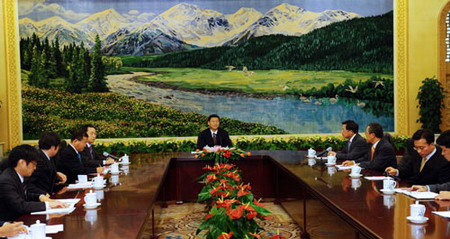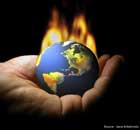Foreign and Military Affairs
Highlights of Xi's interview with Japanese, ROK media
(Xinhua)
Updated: 2009-12-13 10:37
BEIJING: Chinese Vice President Xi Jinping on Saturday had a joint interview with journalists from Japanese and the Republic of Korea (ROK) media ahead of his visit to four Asian nations including the two countries.
|
 Chinese Vice President Xi Jinping (C Rear) receives an interview with journalists of Japanese and South Korean media in Beijing, capital of China, Dec. 12, 2009.[Xinhua] |
Xi will pay an official visit to Japan, the ROK, Cambodia and Myanmar from Dec. 14 to 22, according to the Chinese Foreign Ministry.
Following are the highlights of the interview:
CHINA-JAPAN RELATIONS
Xi said with President Hu Jintao and Premier Wen Jiabao's successful meetings with Prime Minister Yukio Hatoyama, relations between China and Japan have had a good start and maintained a good development momentum. The Chinese government always pursues a friendly policy towards Japan from the strategic and long-term point of view.
China is willing to carry out more exchanges and cooperation with Japan based on the guiding principles agreed by the two sides, and promote the bilateral strategic and reciprocal relations, Xi said, adding he hopes his visit will contribute to this end.
ESTABLISHMENT OF EAST ASIA COMMUNITY
Xi said the proposal of Japanese Prime Minister Yukio Hatoyama to establish an east Asia community shows the importance Japanese government attaches to and its active stance on east Asia regional cooperation. This idea accords with the trend of Asian integration, and is also the common goal of the countries within this region. It is a systematic project to construct such a community, which should be base on reality and meanwhile take a long-term point of view. The most important thing to do at present is to strengthen dialogue and negotiation between countries so as to form consensus.
CHINA-ROK RELATIONS
Xi said China and the ROK have maintained a sound development of relations, with frequent contacts of state leaders and expanding economic cooperation and trade.
The two nations have designated 2010 as Visit China Year and 2012 as Visit Korea Year. Xi said he hopes the two countries will joint hands to well prepare for the 2010 Shanghai World Expo and the 2012 Yeosu World Expo, and take them as important platforms to further promote cultural exchanges between the two countries.
Xi said to further develop the China-ROK relations is conducive to the two people's interests and regional peace, stability and prosperity. China will work with ROK to strengthen the friendly cooperation and be good neighbors, good friends and good partners forever.
He expected his visit to consolidate the two countries' exchanges and cooperation, and promote the China-ROK strategic partnership of cooperation.
CHINA-ROK FREE TRADE ZONE
Xi said to expand trade and economic cooperation is an important part of China-ROK relationship, and a great impetus to promote the ties. He hoped relevant departments of the two countries will speed up their work to create conditions for an early start of official negotiations on the free trade zone.
COOPERATION AMONG CHINA, JAPAN AND ROK
Xi said Asia is one of the most vigorous and promising regions in the world. China, Japan and ROK are major countries in the region. To strengthen cooperation among them not only conforms to their own interests, but also benefits Asia and the world as a whole.
The nations should grasp the historic opportunity to expand cooperation, give play to their cooperation in promoting the east Asia cooperation and contributing to the construction of an east Asia community, Xi said.
SIX-PARTY TALKS ON THE KOREAN PENINSULA NUCLEAR ISSUE
Xi stressed it's China's consistent position that the Korean Peninsula should be denuclearized, that the issue should resolved through dialogue and peaceful ways, and that the peace and stability of the Peninsula and northeast Asia should be maintained.
China will continue to play a constructive role in promoting the six-party talks process, Xi said. He added that China hopes the relevant parties will also work together to resume the six-party talks as early as possible. To continue the nuclear talks process and fully implement the three goals agreed by the Joint Statement of September 2005 is in the common interests of all parties.
CHINA'S MACRO-ECONOMIC SITUATION AND RESPONSE TO FINANCIAL CRISIS
China's annual central economic conference concluded not long ago, Xi said. Confronted with the severe challenges brought about by the financial crisis and extremely complicated international and domestic situation, China timely introduced and comprehensively implemented a package plan and related policies, which have relatively fast reversed the declining trend of the economic growth.
As a result, the momentum of economic recovery has been gradually enhanced and the domestic demand kept increasing rapidly. Economic structure rebalance and energy saving and emissions cut have been actively pushed forward. The reforms and opening-up in major areas have been deepened and people's livelihood has been improved, said Xi.
Under the conditions that China's import and export trade has declined about 20 percent and its external demand contributed minus 3.6 percent to the economic growth rate, China has realized an increase of 11.3 percent in its domestic investment and consumption and an economic growth rate of 7.7 percent in its first three quarters this year.
China's overall economic situation has rebounded. However, many uncertain factors still exist in its internal and external environment, Xi noted.
He said, the Chinese government will further strengthen and improve its macro-control measures and continue a proactive fiscal policy and moderately easy monetary policy, so as to promote the stable and relatively rapid growth of the economy.
He said China will continue to take a responsible attitude in international cooperation on dealing with the economic downturn and make its due contribution to the economic recovery at an early date.
CLIMATE CHANGE
Xi said the climate change has brought about severe global challenges, which can not be coped with by any country alone but through the cooperation of the international community.
As a developing country, China has adopted a series of active measures in energy saving and emissions cut and made remarkable progress in recent years, said Xi.
China announced on Nov. 26 that it would reduce the intensity of its carbon dioxide emissions per GDP unit in 2020 by 40 to 45 percent from the 2005 level, which fully reflected its firm determination in making utmost efforts to tackle the climate change.
Xi said the UN climate change conference being held in Copenhagen could provide an important opportunity for the international community to reach consensus and address the issue together.
Xi called on the international community to adhere to the principles laid out in the United Nations Framework Convention on Climate Change, the Kyoto Protocol and the Bali road map, especially that of "common but differentiated responsibilities" and make joint efforts for the positive achievements of the conference. China is willing to enhance coordination with various countries and play a constructive role in this process.












